13 Tips To Keep Kids’ Teeth Healthy
Like grown-ups, children, too, experience teeth issues from decay to misalignment, to mention a few.
When a child experiences such issues at a tender age, their lifestyle might be affected if quick actions aren’t taken.
It’s well known that tooth problems can cause low self-esteem and other health complications that might be costly to correct.
Therefore, to help your child keep a healthy smile and avoid teeth issues, below are some helpful tips to achieve such.
1. Ensure Dental Health During Pregnancy
As weird as it may sound, it’s vital to consider your baby teeth before they even arrive. Wonder why? The mother-to-be’s dental health is connected to that of her baby. With numerous dental health challenges connected to pregnancy, the unborn baby can experience the same issues if the mother doesn’t practice good oral health.

Once the baby is born, they have no bacteria in their mouth. However, after a short while, they begin acquiring them from individuals close to them, especially the mother.
Unfortunately, if the mother doesn’t keep a clean mouth, the baby’s likely to obtain those harmful bacteria each time their mother kisses them, leading to early oral health complications.
2. Begin Early
Don’t wait until your baby develops their own set of teeth before taking good care of their oral health. The right thing to do is actually start before that.
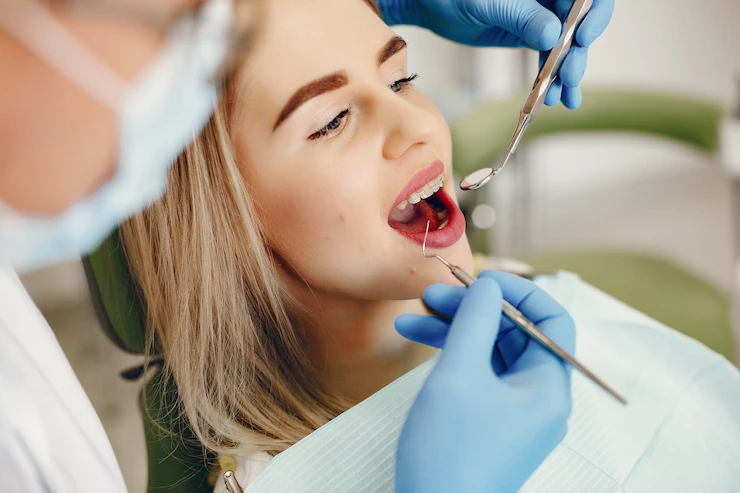
Ensure you wipe your child’s gums using a clean cloth to remove any leftover milk. Besides keeping the baby’s mouth clean and fresh, this practice will ease the transition into tooth brushing as they grow.
You can also visit a reputable pediatric dental center, such as Family Dental Health Center, to learn more about how you can take care of your small baby’s gums and teeth.
3. Do Away With Bedtime Bottle
Sometimes, babies tend to fall asleep more slowly than their parents would want them to. And, if they do, they might wake up after every few minutes.
With everything the mother had to go through the day to ensure everything is in order, she’s probably tired at night and wishes for a peaceful, uninterrupted night. But, this might not be possible with a little one who isn’t sleeping quickly enough.

To ensure that they both catch peaceful sleep at night, most mothers use feeding bottles as babies’ companions.
Unfortunately, these bottles are filled with sweetened milk or juice. As soothing as the feeding bottle will be for the baby and how successful it’ll be in keeping the child peaceful and quiet, the liquid starts to affect the child’s oral health. As a result, the baby may develop bottle tooth decay.
It’s advisable to avoid feeding bottles during bedtime to avoid such dental issues for your child. Also, follow up with clean water each time you feed the baby to eliminate sweeteners that could cause dental decay. However, if doing away with the bedtime feeding bottle is challenging, fill it with unsweetened water.
4. Avoid Sugary Food
You most likely have an idea of the damage sugar can cause to dental health, especially when it concerns young and developing teeth.
When your child indulges in sugary treats, such as candies and sweetened juices, expect them to develop dental issues, such as toothache, sooner or later. Given that it might be challenging for anyone to be around sweets and not indulge, avoiding having them in your home is essential, especially with kids in the picture.
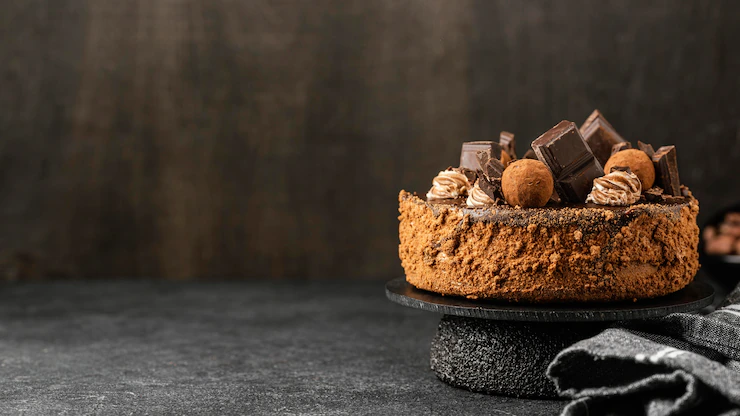
So, instead, stock your house with fresh fruits and unsweetened drinks. For instance, go with some apples and carrots instead of stocking your kitchen with chocolate cakes. Instead of sweetened juices, serve the little ones with fresh milk. While this lifestyle might not be ideal for the baby, practicing it together will be fun, and they’ll soon get used to it.
5. Say No To Pacifiers
Pacifiers and babies are great friends. These gadgets keep children calm and help them fall asleep. However, they aren’t one-sided; they also come with a fair share of disadvantages. A child who uses a pacifier is at high risk of teeth misalignment compared to the one who doesn’t.

Once a child develops teeth or jaw misalignment, it becomes a notorious issue that might be challenging to undo. Teeth misalignment also occurs in children who suck their thumbs, a practice that interferes with the mouth roof development.
Fortunately, you can save your child from experiencing teeth and jaw misalignment by avoiding pacifiers and feeding bottles as soon as possible. Instead, use sippy cups whenever feeding the baby.
6. Prioritize Brushing And Flossing
Besides flossing once a day, children should clean their teeth for two minutes at least twice a day, preferably in the morning and before bedtime.
However, this process should be done using clean water or age-appropriate fluoride toothpaste under adult supervision. It’s advisable to help your child with brushing until they’re four or five years old to ensure they don’t swallow toothpaste or hurt their gums.

For squirmy toddlers, it’s perfectly fine to lie them down on a chair when brushing their teeth. This pose ensures you reach every corner of their mouth while teaching them how to lie on a dentist’s chair. When helping your child brush their teeth, explaining how to hold and move a toothbrush is vital. Remember, toddlers’ toothbrushes should have soft bristles to avoid hurting their soft jaws.
7. Make Teeth Brushing Fun
Don’t assume that toothbrushing will always be a bed of roses for your child. Sometimes, they’ll want to have their breakfast or go to bed without brushing their teeth. Given that even grown-ups sometimes skip toothbrushing, what about little ones who might not be fully aware of the following risks?
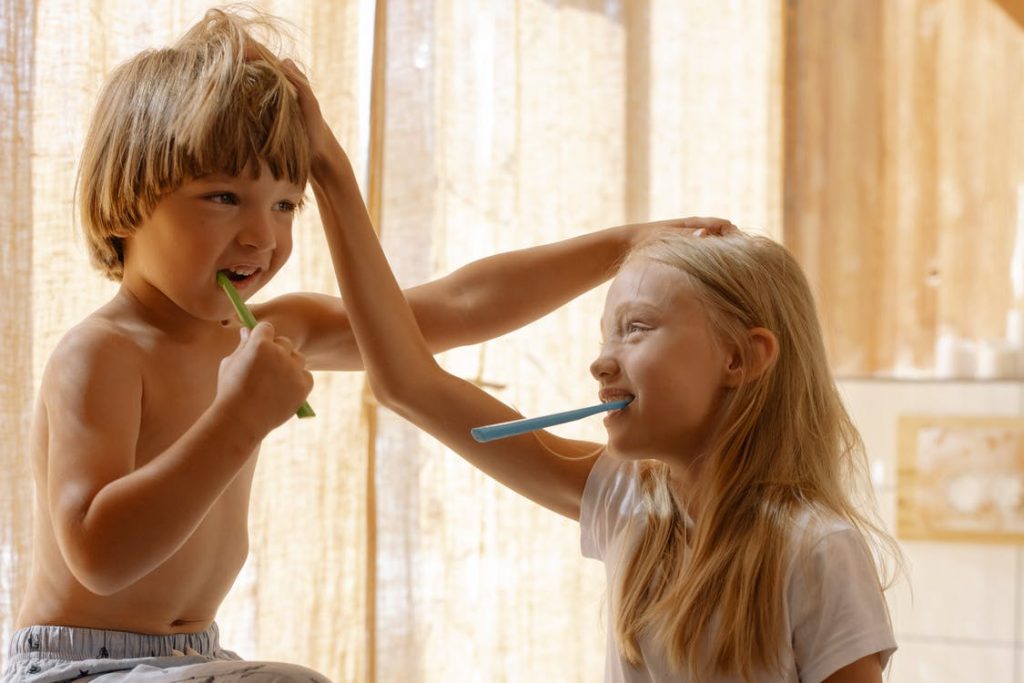
Luckily, you can make the brushing experience fun for the kids. First, select a toothbrush with their favorite characters, and always make it a contest to determine whose mouth is the cleanest.
You can also develop a toothbrushing-themed song to help them brush easily. With such tactics, you’ll be amazed at how the kids will enjoy brushing their teeth.
8. Be A Role Model
Children are perfect learners. They learn and copy what their parents do, especially at the age of up to 27 months. Therefore, letting your children watch you do what you want them to do is vital.

For instance, if you want your child to brush their teeth twice a day, be their role model. Unlike training your child to do things they never saw you doing, having them follow in your footsteps is much easier.
9. Feed Them Healthy Food
Besides brushing and flossing, your child’s diet plays a significant role in their dental health. Feeding your child with calcium-rich food, such as yogurt, cheese, and leafy greens, builds up their enamel, strengthening their teeth.

Additionally, calcium puts cavities at bay since it creates a protective layer between the teeth and the acid that attacks the enamel. Also, your child should drink lots of water as it neutralizes plaque acids that cause decay.
10. Watch Out For Tooth Development Issues
Most dental issues begin as early as the child is born. Failure to recognize them, and the child might develop severe dental challenges, such as teeth and jaw misalignment.

Fortunately, when detected early, these issues can be completely rectified. That said, the parent needs to watch their baby’s dental development as the rest of their physical features. Make sure to always check the child’s jaw line and how the teeth are coming in. If you suspect something off, report to the nearest dentist as soon as possible.
11. Don’t Share Germs
Sharing spoons, sippy cups, pacifiers, and feeding bottles might be the beginning of your child’s dental issues. Regardless of the relationship, your child must not share things that come into contact with anyone’s mouth.
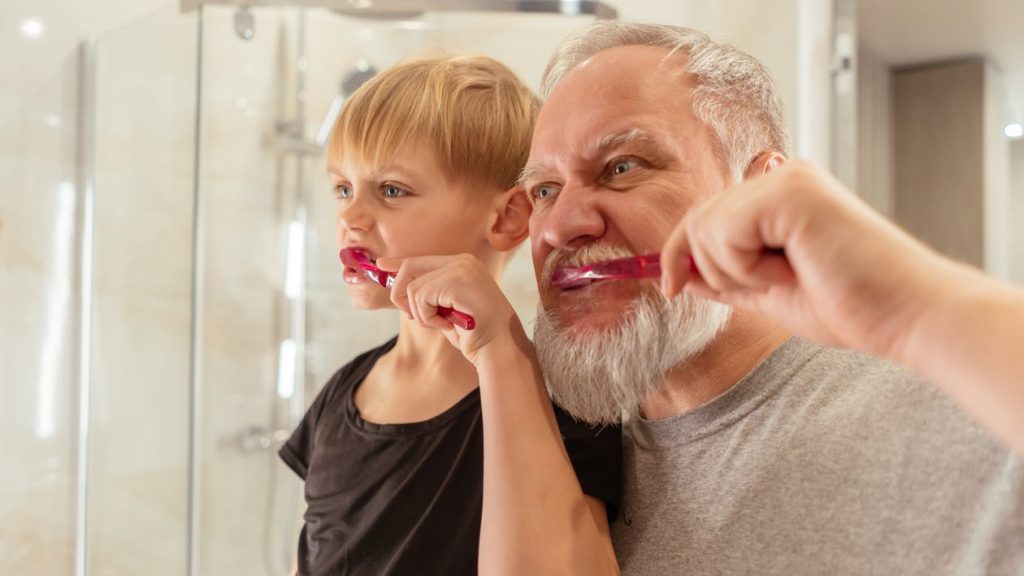
Each person has unique bacteria in their mouth. However, if these bacteria are passed from one person to another, they might cause severe oral damage. It’s, therefore, essential to sanitize everything that enters your child’s mouth to prevent infections, like mouth rush.
12. Protect Them During Physical Activities
In the same way, a child requires protective gear when participating in sports and other physical activities for safety purposes, they should also have dental protective gear. Ensure they have a mouth guard to protect their teeth in case of extreme physical activities.

Nevertheless, your child doesn’t only require dental protective gear for physical sports only. They’ll need them when swimming. Swimming pools are the greatest culprits for dental emergencies during summer.
Therefore, ensure the kids are protected and understand safety rules concerning physical activities.
13. Don’t Miss Dental Appointments
Consulting a dentist at least twice a year is essential for everyone, even for small children. This practice ensures that the dentist points out potential dental issues as soon as they start to show. With early detention, treating these issues is easy and fast.
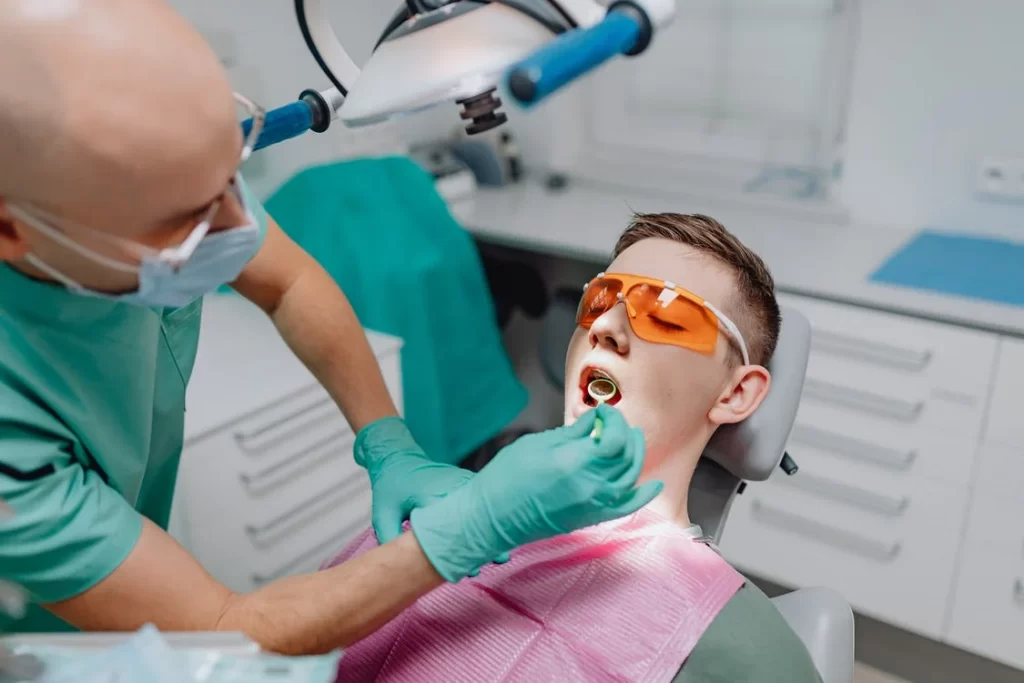
Children should begin their dentist appointment within six months after their first tooth and twice a year after that.
Conclusion
Keeping kids’ teeth healthy can be challenging, especially with lots of unhealthy food readily available. Besides food, poor lifestyle choices and lack of knowledge can also cause dental issues in children.
For instance, new moms might not know that feeding bottles and pacifiers can be the root cause of their children’s teeth issues.
Fortunately, with a slight change of lifestyle that includes brushing twice a day, eating a healthy diet, and keeping dentist appointments, your child can develop and keep healthy and strong teeth.
Additionals:
- Stained Teeth & What You Can Do About It
- Important Dental Habits To Teach Your Children
- Why Should You Consider Whitening Your Teeth
- 7 Things to Think About When Getting Tooth Aligners



